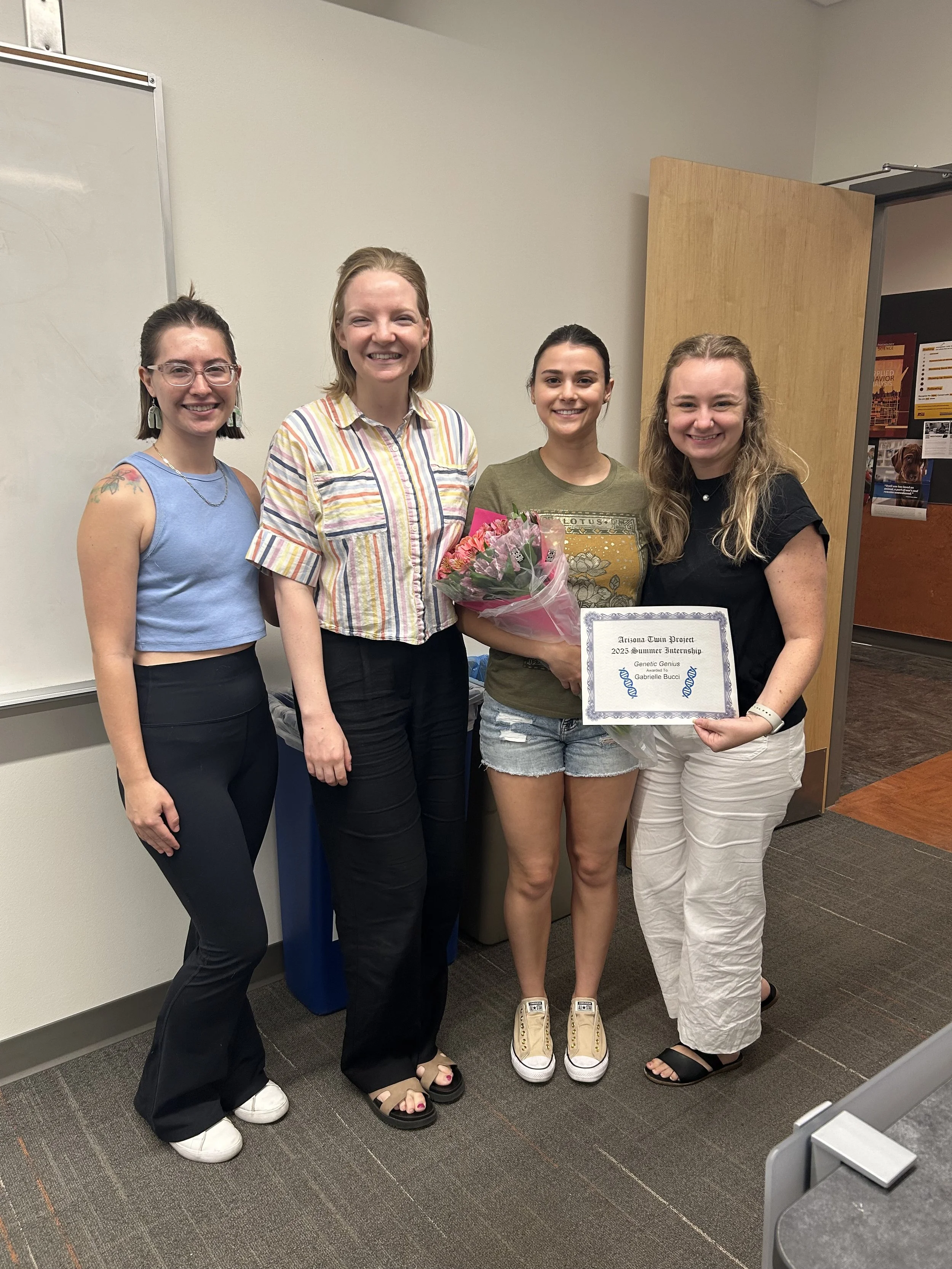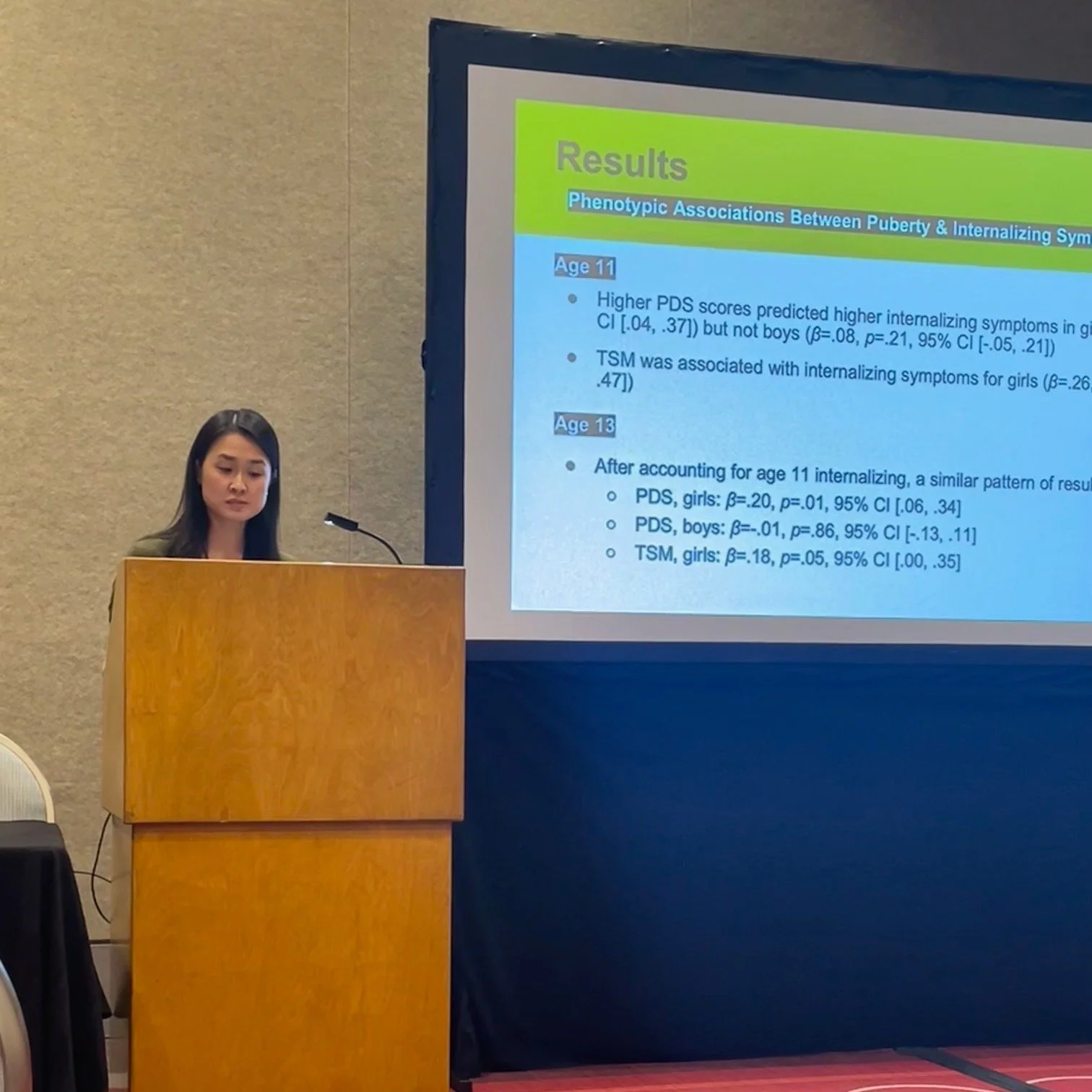Arizona Twin Project
Southwest Twin Panel
Interested in participating?
Our study first started as the Arizona Twin Project, an ongoing longitudinal study designed to better understand gene-environment interplay underlying the development of risk and resilience to common mental and physical health problems during infancy, childhood, and adolescence. Since then, we have expanded into the Southwest Twin Panel, beginning by welcoming twins in New Mexico! We run individual, family, neighborhood, and sociocultural levels of analysis, with an emphasis on sleep, pain, physiological stress processes, mental and physical health, and academic competence. Importantly, our ethnically diverse sample affords the opportunity to consider the role of culture in the etiology of various child outcomes.
Why do we study twins?
Twins are fascinating and have long been studied as a means of deducing the roles of nature and nurture in human development. Identical or monozygotic twins share 100% of their genes; as such, any differences that emerge between them must be the result of differences in their environmental experiences. Fraternal or dizygotic twins, who share only 50% of their genes, serve as an ideal comparison group. By comparing the extent to which identical and fraternal twins resemble one another on certain traits, we can determine the degree to which genetic and environmental factors influence those traits. For example, if identical twins are more similar to one another than fraternal twins, we can conclude that a trait is heritable. Conversely, if fraternal twins are just about as similar to one another as identical twins, environmental experiences shared by the twins are implicated. We study twins residing across all of Arizona and New Mexico, providing a diverse representation of families living in the Southwest and capturing important contextual differences.
Importance of Inclusion
The Arizona Twin Project team is dedicated to living out the ASU charter. We celebrate and support different backgrounds and perspectives and aim to better understand the people around us. We believe that all of our differences make us stronger and work hard to ensure our research reflects these ideals. Our ongoing longitudinal research is designed to elucidate gene-environment interplay underlying the development of risk and resilience to common mental and physical health problems during infancy, childhood, and adolescence.
Featured Research Assistants
Every month, we like to recognize our hard-working undergraduate research assistants (RAs)! We have around 50 RAs each semester, and we choose the most dedicated and professional RAs who have demonstrated excellent skill during the previous month. These are the RAs of the month from the last few months:
Lab Happenings!
2025
ATP at the 64th Annual Multiples of America Convention in Tucson!
Dr. Kathryn Lemery-Chalfant, graduate students Alexys Murillo and Savannah Ostner, and staff members Sam Norem and Jen Kennedy attended and led a workshop at the annual Multiples of America Convention. In their presentation, they focused on what makes the Arizona Twin Project unique, due to the emphasis of both developmental psychology and genetics, while taking a look at gene-environment interplay and goodness of fit!
ATP at the Behavior Genetics Association conference in atlanta!
Samantha Miadich: “The Role of Early-Life Caregiver Factors on the Heritability of Childhood Health and Development”
Alexys Murillo: “Temperament Types Uncover Shared Environmental Risk for Child Psychopathology” & “Polygenic Environmental Sensitivity and Epigenetic Aging in the Dynamics of the Parent-Child Relationship”
Janna Maravilla: “Genetic and Environmental Influences on Internalizing Symptoms in Middle Childhood: Moderation by Sibling Warmth”
Christy Bui: “Examining the Unique and Shared Genetic and Environmental Contributions to Objectively Measured Sleep Duration in a Community Sample of Twins Across Childhood and Adolescence”
ATP AT THE Society For research In CHild DevelopmenT (SRCD) in Minneapolis!
Dr. Sierra Clifford: “Objectively Measured Screen Time is Associated with Sleep Timing and Variability in Adolescence"
Janna Pickett: “Sibling Concordance of Internalizing Symptoms: Moderation by Sibling Closeness”
Christy Bui: "Multiple Indicators of Pubertal Development in Adolescent Twins: Links with Internalizing and Genetic Contributions" & "Examining the Effects of Objectively Assessed and Self-Reported Sleep Quality on Internalizing Symptoms in a Community Sample of Adolescents"
ATP at the society for behavioral medicine conference in san francisco!
Eva Bartsch: “Genetic and Environmental Contributions to Physical Activity, Dietary Intake, and Adiposity: Insights from the Arizona Twin Project”
2024
Dr. Leah doane Featured on Arizona Horizon (Arizona PBS)!
Dr. Leah Doane was recently invited to Arizona Horizon to talk about chronic stress. Watch below at the 17:30 minute mark as she highlights how ongoing stressors such as the pandemic, racial injustice, and environmental concerns can profoundly impact health, disrupt sleep, eating patterns, and overall bodily function.
ATP at the annual Behavior Genetics Association conference in London!
Dr. Kathryn Lemery-Chalfant: “Genetic and Environmental Influence on Children’s Temperament Dimensions and Types”
Eva Bartsch: “Genetic and Environmental Contributions to Physical Activity and Dietary Intake in the Context of Adiposity: Insights from a Community Sample of Twin Children”
Savannah Ostner: “Resilience Factors and Adolescent Externalizing Symptomatology: Genetic & Environmental Contributions”
Christy Bui: “Examining the Heritability of Objectively Assessed and Parent-Reported Sleep Duration in a Community Sample of Twins Across Infancy, Childhood, and Adolescence”
Recent ASU Department of Psychology Awards!
Dr. Leah Doane received the Samuel Leifheit Service Award, which is given to individuals who go above and beyond in their service to others. We are happy to see Dr. Doane recognized for her exceptional leadership and compassionate support for others!
Janna Pickett was awarded with the Graduate Professional Student Association Teaching Excellence Award and the Psychology Department Graduate Student Pedagogy Award for her course on social development during the Spring 2024 semester! Her innovative approach included a mix of activities such as group discussions, hands-on activities with Legos and a service learning project where students made blankets for children who have experienced trauma.
Eva Bartsch received the Dr. Elizabeth Capaldi Phillips Memorial Award for Graduate Research in the Psychology of Eating for her work in studying genetic and environmental factors underlying eating habits and dietary intake. She was also awarded the Sharon Manne Graduate Student Research Award for her dedication to addressing important mental and physical health issues.
Emma Lecarie has graduated with her Ph.D. in Clinical Psychology! She will be continuing her journey with the Primary Care Psychology Postdoctoral Fellowship at Children's Hospital, Colorado!
Research assistant, isabella rusy, selected as a finalist for this year’s best psychology thesis award!
ATP at the 2024 Society for Research on Adolescence (SRA) Annual Meeting!
Undergraduate students:
Ajuni: “Infant Temperament Types and Internalizing Symptomology Across the Transition to Adolescence: Moderation by Family Relationship Stress”
Arden: "The Associations Among Parental Adverse Childhood Experiences, Parenting Behaviors, and Adolescent Psychopathology"
Euan: “Links between ACES and Internalizing and Externalizing Symptoms in Adolescence: Moderation by a Novel Resilience Composite”
Max: “Parenting style, parental engagement, and school engagement: Does self-efficacy play a role?”
Graduate students:
Eva: "Internalizing Symptoms during Adolescence: Sex Differences in the Interactive Relations of Body Mass Index and Interpersonal Stress"
Alexys: "Inconclusive Findings on the Structure of Affect in Adolescence: Insights from Daily Diaries"
2023
ATP Graduate Student awards
Savannah: GPSA Individual Travel Award for SRCD, GPSA Career Development Travel Award for Institute of Statistical Genetics Workshop, SRCD Student Travel Award, BGA Student Travel Award, GPSA Individual Travel Award for BGA, and the Graduate Excellence Award
Alexys: Developmental Travel Award, GPSA Independent Travel Grant, and the Graduate College Travel Award
Emma Lecarie, passed her dissertation defense!
Welcome our new Graduate student, Christy Bui!
Eva Bartsch awarded the Rising Star Award at the International Behavior Genetics Association conference in Murcia, Spain
Research Assistant, Haley hummel, selected as the spring 2023 Dean’s medalist for the department of psychology!
















